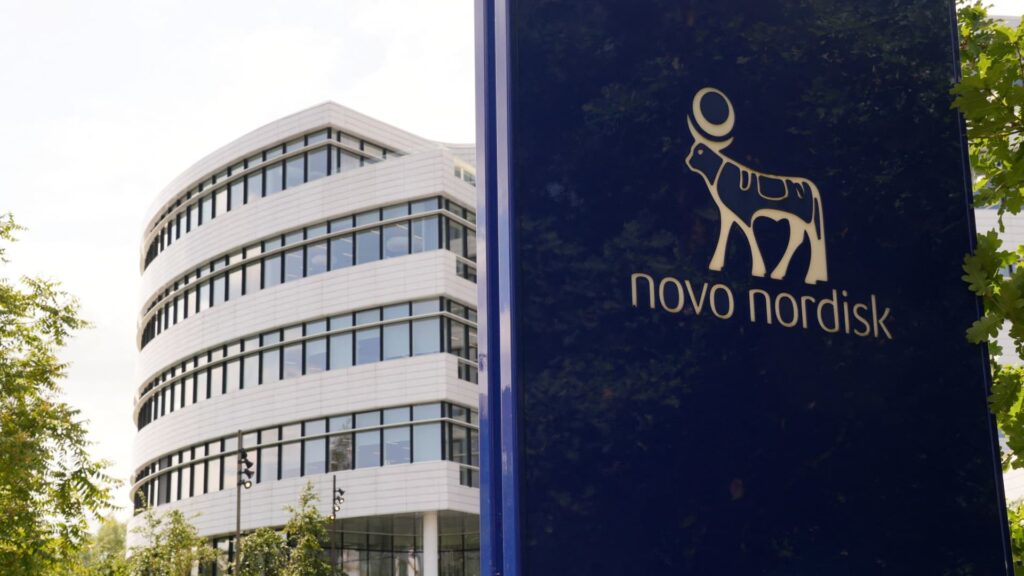A view shows a Novo Nordisk sign outside its office in Bagsvaerd, on the outskirts of Copenhagen, Denmark, on July 14, 2025.
Tom Little | Reuters
Shares of Novo Nordisk on Monday fell to a four-year low after the Danish pharmaceutical company said a highly anticipated trial for Alzheimer’s disease failed to meet its main goal.
The trial tested whether semaglutide — the active ingredient in Novo’s blockbuster diabetes and weight loss drugs Ozempic and Wegovy — helped slow progression for Alzheimer’s disease.
While treatment with semaglutide resulted in improvement of Alzheimer’s disease-related biomarkers in two separate trials, this did not translate into a delay of disease progression, Novo said in a statement Monday. The goal had been to slow patients’ cognitive decline by at least 20%.
Novo stock was down 10% to 274 Danish kroner ($42.33) in afternoon trade, its lowest level since mid-2021. The shares later regained some ground to preliminarily close the session 5.8% lower.
Analysts had prior to the results called the trial a long shot, whereas Novo itself had referred to it as a “lottery ticket.”
“Based on the significant unmet need in Alzheimer’s disease as well as a number of indicative data points, we felt we had a responsibility to explore semaglutide’s potential, despite a low likelihood of success,” said Novo’s chief scientific officer, Martin Holst Lange.
A long shot
The trial results are a setback for Novo investors that had hoped that it might reignite the company’s battered share price. Even before the Monday readout, Novo stock had halved year to date amid a series of guidance cuts and heighted competition, especially in the key U.S. market.
“While hopes were not high for a positive readout, potential success had perhaps kept some in the name, with this result removing a near-term upside scenario,” wrote Jefferies analysts on Monday.
Alzheimer’s disease, the most common form of dementia, is notoriously difficult to treat. It is also expected to affect an increasing proportion of people worldwide as populations grow older.
Current treatments such as Eli Lilly’s Kisunla and Biogen/Eisai’s Leqembi have been shown to slow down the progression of the disease by up to a third, but come with the risk of severe side effects. Shares of Eli Lilly traded nearly 0.8% higher Monday at the closing bell in London, while Biogen stock rose 2.6%.
Novo’s decision to test Rybelsus, an oral form of semaglutide, had been largely based on real-world evidence suggesting a correlation between Alzheimer’s and taking semaglutide.
The drug works in a similar way to Lilly’s rival medicines Mounjaro and Zepbound by mimicking the gut hormone GLP-1 that naturally occurs in the body, to regulate blood sugar levels and enhance feelings of fullness. It’s not yet clear how GLP-1s might benefit Alzheimer’s patients, but the theory is that it targets the neuroinflammation thought to impact them.
Top-line results will be presented at the Clinical Trials on Alzheimer’s Disease conference on Dec. 3, with full results at the 2026 Alzheimer’s and Parkinson’s Diseases Conference in March, Novo said.
A competitive market
While shares of Novo Nordisk have plunged over the past 18 months, rival Eli Lilly only last week became the first pharmaceutical company with a market capitalization of $1 trillion.
Even as Ozempic hit the market four years before Mounjaro, Novo’s head start hasn’t prevented Lilly from quickly grabbing a bigger market share in the U.S.
This year, Novo has cut its guidance several times, blaming so-called compounders which sell copycat versions of semaglutide for a cheaper price.

Novo recently replaced its chairman and half its board members over a disagreement between the former board and Novo’s controlling shareholder, the Novo Nordisk Foundation, about the scope and pace of change needed. It came just months after former CEO Lars Fruergaard Jørgensen was booted after an eight-year reign due to the stock decline.
The former board was “too slow in recognizing the significance of the market changes in the United States,” new Chair Lars Rebien Sørensen said at the time.
New CEO Mike Doustdar, who previously headed Novo’s ex-U.S. operations, quickly set out to refocus the company’s commercial priorities to its core obesity and diabetes businesses and to cut more than 10% of its global workforce.

